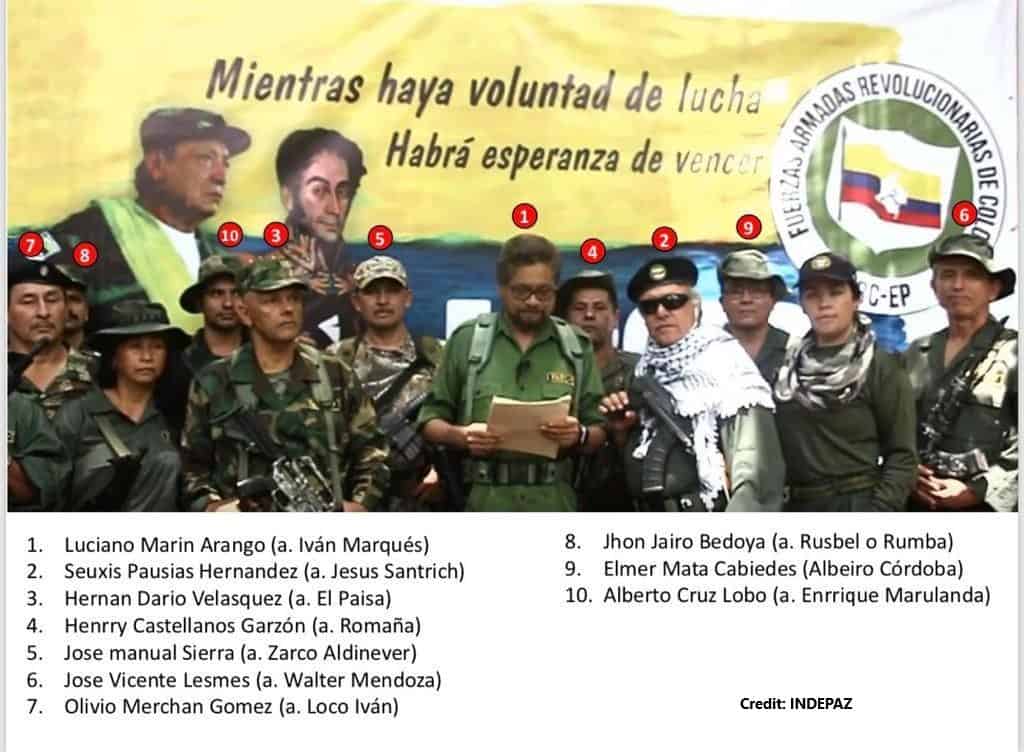Key ex-FARC-EP Commanders Announce Return to Arms
ABColombia calls on the Colombian State and the International Community to redouble its efforts and working together with civil society to ensure a much faster implementation of the Peace Accord.
On 29 August 2019, Iván Márquez, a lead negotiator of the Peace Accord and former Revolutionary Armed Forces of Colombia – People’s Army (FARC-EP) commander, together with two other key ex-FARC Commanders announced they are rearming and plan to seek alliances with the ELN guerrilla group.[1]
This is a major blow for the victims, and civil society in general, who have suffered the greatest impacts of the armed conflict. Colombian citizens want peace. It is therefore essential to ensure the full implementation of the Final Peace Accord signed in 2016.
According to a pronouncement by Marquez on 20 August 2019 their reasons for rearming include the lack of political commitment to implementing the Peace Accord, the rising number of FARC ex-combatants being killed, the conditions in which FARC combatants have had to live ever increasing number of social leaders being killed and legal insecurity amongst other things.
Although the announcement came from three key commanders it was not supported by the FARC political party (Fuerza Alternativa Revolucionaria del Común – FARC). “It is true that the fulfillment of the Agreements by the State is moving at an [incredibly slow pace], and that reincorporated [ex-farc combatants] have gone through serious difficulties… No one denies that important sectors and interests work incessantly against the agreement…We call the people of Colombia, the national government, the international community, the businessmen and unions, the social and popular movement, the ex-guerrillas and former guerrillas … to surround as never before the Havana Agreement and its implementation. This is not a time for hesitation. War cannot be the destiny of this country. We will continue, ready to give our all for peace and social justice.”
Very few FARC ex-combatants have left the peace process despite suffering considerable hardships in their living conditions, slowness in the implementation of the Peace Accord and subsequent attempts to change the Agreements made in the Accord. According to Fundación Ideas para la Paz (Ideas for Peace Foundation-FIP) a Colombian think-tank, only 8 percent of demobilised FARC members are currently unaccounted for and of that 8% not all have re-armed, the majority have reincorporated and begun a new life.
It cannot be denied that there have been attempts by the new Government of Ivan Duque Marquez to undermine the implementation of the Peace Accord. In particular slowness in the implementation of the Rural Reform Chapter of the Accord, attacks on the Transitional Justice System, an undermining of the Crop Substitution Programme and failure to allocate a sufficient budget for the implementation of the Peace Accord.
The Peace Process has brought about important gains including the general homicide rate decreasing dramatically since the start of the Peace Process; and we have seen many in the armed forces and the FARC guerrilla willing to tell the truth and to submit themselves to the Transitional Justice System, helping Colombia to move towards a firmer foundation for access to justice and transparency. However, the targeted killings of social leaders have grown exponentially, we have seen political space for peaceful opposition closing and a failure to address the violence generated in the rural areas by the neo-paramilitary and the ELN Guerrilla. The Colombian State need to demonstrate, by their actions, that they are committed to the full and rapid implementation of the Peace Accord, which will address major issues of inequality and injustice. As well as, taking effective action to address issues of protection for social leaders and rural communities.
The peace process has brought about some transformative changes that civil society want to hold onto and build-on. Achieving a Peace Accord is always immensely difficult, but the real work starts with its implementation. All processes hit major obstacles, it is therefore essential at this moment in time to pursue a path of transparent and honest dialogue in order to overcome these obstacles. Proactive objective support from the International Community is essential if this is to be achieved. The UN Office of the High Commissioner for Human Rights in Colombia, The UN Security Council Monitoring Mission to Colombia and the Guarantor Countries for the implementation of the Peace Accord have all played a positive role to date in the Peace Process in Colombia and ABColombia calls on them to take a proactive role at this time.

Footnotes
[1] The ELN were the second largest guerrilla group after the FARC, they are now the largest guerrilla group in Colombia. Peace Talks were initially suspended and then finally broke down under the Duque government at the beginning of this year.
